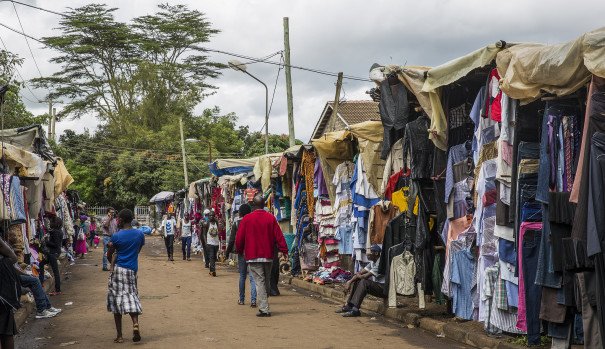
How Not to Watch Soccer in Kenya

How Not to Watch Soccer in Kenya
Ethiopian Coffee in Nairobi
It is January 2012. Dusk has just fallen. I am in Nairobi, in an Ethiopian restaurant called Habesha, watching my beloved Arsenal play for their lives against Manchester United, and at this exact moment my brain is so near to bursting that if someone put his thumb to the base of my skull and applied just enough pressure my head would pop off like a champagne cork. People are watching the TV and screaming and yelling and coping with power outages. The allegiances are split evenly down the middle, and split ferociously. The atmosphere in the bar is so charged lightning practically crackles in the air. Two huge men are close to a fistfight.
All sports are designed to break your heart, but soccer is uniquely designed to draw that breaking out for as long as it possibly can. To watch soccer is to be pitched like a rowboat in a tempest between elation and despair. Arsenal in particular is the John Keats of British soccer: beautiful, fragile, and doomed. And yet even the most inured-to-tragedy Arsenal fan has not understood what despair looks like until he has watched his team lose in a bar full of manic African supporters.
Being a prudent, sensible person with the liquor tolerance of a 95-pound runway model (and who has a flight to London in four hours), I have prudently and sensibly ordered coffee instead of alcohol. Twenty minutes later, bugeyed on caffeine, I realize I have made a terrible mistake.
Ethiopian coffee turns out to taste like Tom Waits’ voice if it were liquid and ablaze. If coffee is a stimulant, Ethiopian coffee is smoking crack out of a lightbulb fragment. It tastes like the stuff Noah used to seal up the ark. It arrives in a slender ceramic vessel called a jebena, and is poured through a long spout into small cups. A small stick of incense accompanies the service, though I still don’t know why. On the off-chance the pungency of the coffee alone hasn’t already laid you out, maybe. Between the agony of watching the clock run out on Arsenal’s Champions League chances and the coffee throwing open all the gaskets and valves on my nervous system, I’m as easy to shatter as an iPhone screen.
But then, it’s not just the coffee. I am in Nairobi because I am on my way home from South Sudan. I flew in this morning from Juba; in four hours, I will get on a flight to Heathrow. I’d been in South Sudan for just a week. My girlfriend Shannon was doing thesis research there, and because a recent outbreak of massacres had caused her thesis partner to bail, I took the money the school had allocated for that ticket and bought one for myself. Because we bought our tickets separately, she was flying through Addis Ababa, and we would meet up in London.
I’d done a lot of traveling up to this point. I’d crossed Southeast Asia overland. I’d spent four punishingly hot summers in China. I’d lived in Ireland for two years, bartending from dusk till dawn in a club while going to school full time. And it took exactly five days of unrelenting heat and dust, constant fatigue, fly-covered meat, public vomiting, shakedowns from officials, failed article pitches, and hostile locals for Juba to break me like a cheap toy. The day before I’d finally sat Shannon down and told her that I couldn’t live in Juba. She did a good job of not showing her disappointment. She liked Juba. All year we’d been talking about where we would move when she graduated: Lagos, Dakar, Nairobi. One by one these had been falling off our radar screens. And now Juba was gone, too.
Limits, it turns out, are not things you can just chug a Gatorade or lace up your Nikes and push past. Limits are real, they are hard, and when you slam into them, it hurts.
United scores, going up 2-1, and half the bar explodes in euphoria. Men are dancing and waving beer bottles. My throat is dry, my hands are shaking, and the coffee is working black magic inside my guts. I opt for a beer, a Tusker Malt, to try to soothe my frantic heart. It doesn’t work. I hate this sport.
I wish I could just decide that we will lose, and spend the remaining half-hour of the game believing that, accepting it. That would calm my heart and bowels (the coffee having now reached them, too). It would be so much easier. But hope has a terrible habit of springing eternal. And so by the time the game ends I am haggard, scooped out. My friends have to help me to the car; I can barely stand. Arsenal has lost, because they are Arsenal, and losing is what they do, more beautifully than any other team in the world. In the jouncing, swerving taxi to the airport, the coffee mania finally ebbs. I drift off to sleep. I have been beaten hollow by the newest country on Earth, I am on my way to London to rejoin the woman I love, and for once in my life, I have not got a thing to complain about.